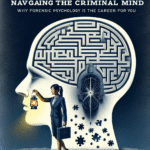
Introduction
In an age where crime dramas dominate our screens and true crime podcasts are all the rage, the field of forensic psychology has emerged as a compelling domain that sits at the intersection of psychology and the legal system. Many have found themselves captivated by the intricate workings of the human mind, particularly when entangled in judicial matters. Unlocking Minds: A Journey into Forensic Psychology Careers not only promises to shed light on what this career entails but also explores what it takes to thrive in this unique profession.
Forensic psychology is more than just the subject of popular TV shows; it is a vital field that seeks to understand the psychological underpinnings of criminal behavior, offering valuable insights to law enforcement, courts, and the mentally ill. As you delve deeper into this journey, prepare to unlock the complexities behind the minds of criminals, victims, and everyone in between.
The Role of Forensic Psychologists
Forensic psychologists play a crucial role in the legal system, offering their expertise in several capacities. They are often involved in evaluating defendants, providing expert testimony in court, and advising on cases involving psychological disorders. Their work bridges the gap between psychology and law, making them indispensable in various scenarios.
Key Responsibilities
- Assessment and Evaluation: Conduct forensic assessments to determine mental competency, risk of reoffending, and other critical psychological states.
- Expert Testimony: Provide credible and clear testimony in court regarding psychological findings.
- Consultation: Offer insights on jury selection and trial strategy.
- Research: Conduct studies that inform legal policies and practices.
Case Study: The Trial of the Century
One notable example of forensic psychology’s role in the justice system is the infamous O.J. Simpson trial. Forensic psychologists played a considerable part in evaluating witnesses, interpreting evidence, and providing insights into Simpson’s mental state. Their evaluations and testimonies shaped public perception and impacted the trial’s outcome, demonstrating the profound influence of psychology on legal proceedings.
Educational Pathways to Forensic Psychology
Pursuing a career in forensic psychology requires a solid educational foundation, typically starting with a bachelor’s degree in psychology, criminal justice, or a related field. From there, while there are many paths one may take, it’s crucial to follow a route that offers both theoretical and practical exposure to the field.
Required Degrees and Certifications
- Bachelor’s Degree: This is the initial step where foundational knowledge is acquired.
- Master’s Degree or Ph.D.: A more advanced degree is often necessary for specialized roles. Many choose to pursue degrees specifically in forensic psychology.
- Licensing: In the U.S., becoming a licensed psychologist requires passing the Examination for Professional Practice in Psychology (EPPP) followed by state-specific requirements.
Certifications
- Board Certification in Forensic Psychology: Offered by the American Board of Professional Psychology (ABPP), this credential can enhance job prospects.
As you embark on the journey of unlocking minds, knowing the educational roadmap is vital for planning your career progression.
Skills Necessary for Success
To excel in forensic psychology, certain skills are indispensable:
- Critical Thinking: Ability to analyze complex situations and make informed decisions.
- Communication Skills: Proficiency in conveying complex psychological concepts clearly in both written and verbal formats.
- Empathy: Understanding and relating to the experiences of others while maintaining professional boundaries.
- Research Proficiency: Skills in conducting thorough research to inform assessments and legal decisions.
Each skill plays a significant role in performing duties effectively and ethically.
Real-World Applications of Forensic Psychology
Unlocking Minds: A Journey into Forensic Psychology Careers also involves examining how forensic psychologists can impact the broader social justice system. Their work influences not just individual cases but also informs policy and reform initiatives.
Case Study: John Wayne Gacy
The analysis of serial killer John Wayne Gacy’s behavior and psychology has been crucial in understanding the nexus of mental illness and criminality. Gacy was evaluated extensively, providing significant insights into antisocial personality disorder. His case informs forensic psychologists today, highlighting the need for adequate mental health assessments in the legal system.
Statistical Overview
| Factor | Description |
|---|---|
| Education Needed | Bachelor’s + Advanced Degree |
| Median Salary (USA) | $70,000 – $100,000 |
| Job Growth Rate (2020-2030) | 3% (average) |
Career Opportunities in Forensic Psychology
Forensic psychologists find opportunities in various fields, including:
- Law Enforcement Agencies: Assisting with criminal profiling and investigations.
- Courts: Providing expert testimony and psychological evaluations.
- Hospitals and Rehabilitation Centers: Working with offenders with mental health issues.
- Academia: Teaching or conducting research to influence policy.
Applying psychological principles to these environments underscores the versatility and impact of forensic psychologists on society.
Challenges in Forensic Psychology
Despite its rewarding nature, a career in forensic psychology isn’t without challenges.
Stressful Situations
Dealing with violent crimes and unsettling behaviors can take its toll. To cope, practitioners must engage in self-care and seek supervision as necessary.
Legal Constraints
Working closely with the law can be restrictive and requires an understanding of legal standards. Forensic psychologists must navigate the complexities of legal proceedings while maintaining objectivity.
Conclusion
Unlocking Minds: A Journey into Forensic Psychology Careers reveals the immense opportunities and challenges present in this field. Whether through assessing criminals, aiding in legal processes, or advocating for mental health reform, forensic psychologists play a crucial role in society.
As you consider embarking on this journey, remember that your passion for understanding human behavior is your best asset. Continue to learn, grow, and stay committed to this essential calling. Your journey could lead you to be a pivotal force for justice and understanding in a world where the human psyche remains a complex enigma.
FAQs Section
1. What does a forensic psychologist do?
Forensic psychologists evaluate individuals involved in legal matters, provide expert testimonials, and help understand the psychological elements behind crimes.
2. How much does a forensic psychologist earn?
The median salary ranges between $70,000 to $100,000, depending on education, experience, and location.
3. What qualifications do I need to work in forensic psychology?
A bachelor’s degree is the starting point; advanced degrees and licenses are essential for practicing professionally.
4. Is the field of forensic psychology growing?
Yes, job growth in this field is projected to be around 3% from 2020 to 2030, which aligns with the average across professions.
5. What are the biggest challenges faced by forensic psychologists?
Managing stress, navigating legal complexities, and maintaining objectivity in emotionally charged situations are significant challenges in the field.
This guide to unlocking minds through a journey into forensic psychology careers serves as a valuable resource for anyone considering this path. As you step forth, remember, every insight and revelation in this field can pave the way for greater understanding and social justice.

















